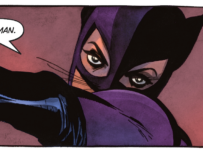
Samuel Vimes is one of the most beloved, and most featured, of all characters in the ever broadening Discworld series. When Terry Pratchett presents you with a City Watch book (“City” having become increasingly loosely defined as the series has progressed), you attack it in a different mind frame to any of his other books. This is because, when Vimes is in Pratchett’s hands, he becomes an incredibly single minded author. It is only rarely that we are taken out of the mind of Ankh-Morpork’s chief protector, and then that is usually only to be placed at the mercy of the inscrutable Lord Vetinari.
Essentially, Pratchett knows what he likes when he’s writing Vimes, and he hopes that the audience likes it, too. Fortunately, Pratchett is in but one of his many elements. The transcendental nature of I Shall Wear Midnight was always going to be a hard act to follow, so Pratchett does not try. Instead, he places us in the company of a man who has not had a book to himself since 2005 – and he has had the good grace to have made the world move in such time. Vimes is not in the same space as he was in Thud!, and the novel reads all the better for it.
Commander Samuel Vimes of the Ankh-Morpork City Watch is forced by his wife to go on a two week holiday at his country estate. Unfortunately, the laws of narrative causation and Patrician scheming being as they are, something is rotten in Scoone, and Vimes has to learn the values of yet another marginalised, misunderstood and maligned substrata of society, accompanied by a light patina of Jane Austen references and hardened gentlemen.
The idea of sending Vimes outside of his jurisdiction is nothing new, but in the country he doesn’t have to exercise tact and diplomacy. He doesn’t have to worry about offending a governing body, because what customs there are that are different to those of the city are the customs of corruption. In Scoone, Vimes allows himself free rein because he is able to see where respect and procedure are required, and he feels within his rights to impose them.
For the longest time, we’ve been given the impression that Vimes is a man incapable of making mistakes; as Pratchett’s pet character, he’s near infallible between these pages. As “Vetinari’s terrier”, the man needs only to be pointed in the right direction and crimes seem almost to solve themselves. Vimes is a moral pillar whose foibles have been weathered away in the 22 years since his first appearance in Guards! Guards! Â He’s always right, and nothing is a challenge to him. In the unique position of being able to synthesise information and to always know precisely what to do with it – with the occasional input of Sybil, whose participation in these pages is most welcome – Vimes, backed by his enormous fortune, can achieve anything.
Since he conquered the Summoning Dark in Thud!, the majority of his quandaries have dissolved.
This is not to say that Snuff, or Vimes, is boring. The utility of the Summoning Dark in this book is both surprising and satisfying, and an argument could be made for further exploration of this aspect of Vimes; he has discarded most of his internal baggage, and so now he can only be threatened by external forces, even if they sometimes attempt to act upon him from within. We are therefore invited to reflect upon Vimes' love for his son, Young Sam, who has benefited from the time since Thud! by ageing five years and gaining a character of his own. Young Sam's scatological fixation makes that character rather one note, but Pratchett successfully brings it back to Vimes. This aspect of the Commander is not surprising, but it is undeniably new and the logical progression for a man who has been around for a long time. Snuff works largely because Pratchett understands how Vimes works.
Without the rest of Vimes' usual supporting cast, Pratchett uses Willikins as a crutch to mixed success. The man is amusing but works best as a secret weapon; we are reminded too often of his rough and ready nature. Still, he gets some very nice moments and effectively closes the circle in one of the book's codas. One has to hope that, like the comb that he carries about his person, Willikins is put away until required. The only new character that sticks is provincial copper Upshot, a quick learner with a satisfactory arc.
Conversely, Stratford is a weak villain for Vimes to go against, singularly failing to be the mirror that Pratchett believes him to be. He’s possibly supposed to be the equivalent of Night Watch‘s Carver, but he is introduced too late and does too little to establish himself as anything like a credible adversary; certainly his actions don't warrant Vimes' extreme reaction. One of the other villains is simply named, his privilege short circuiting his need to appear on the page; the overarching theme of haughty nobs exploiting those below them is far more effective than the simple man on the ground, but one feels that Pratchett needed to make someone involved in the practicalities culpable.
While the character work is slightly mixed, Snuff is narratively satisfying. The goblin society is well established, albeit lazily defended by the Two Dozen and One Greyhounds escape clause, and Pratchett is as sharp on class warfare as ever. Snuff still has the capacity to surprise, with complicated chickens and river boat action sequences coming almost from nowhere (except the cover upon which they feature prominently). The strange Austen material and obvious punchline (nestled after the footnotes in the ebook edition) are brief red-herrings in a book that is generally a straight line to the finish.
There is little room for subtlety, and emotional response is mooted largely because the characters behave within their firmly established parameters, but Snuff is a solid Discworld title. It does not belong in the pantheon of Pratchett's great works, and is definitely a comedown after the absolutely exquisite I Shall Wear Midnight, but it would be petty not to recommend it.


